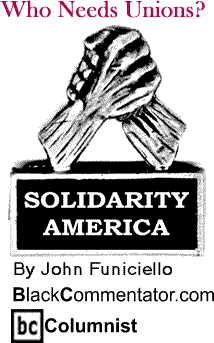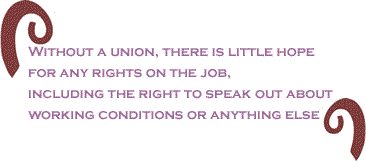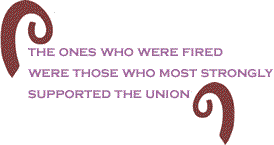
|
|||||||||||||||||||||||

|
|

Custom Search
|
|
 |
|
“Unions once served a purpose, but they don’t anymore.” Throughout the past 30 years, that assessment of the union movement in America has been heard repeatedly, mostly from people who work in the so-called technological, information, or other “industries,” where workers don’t sweat much (at least, from the skin) and who believe that they are in control of their own destinies. The
mergers, downsizing, and consolidation of those “industries” since
the 1980s have drastically changed the minds of millions of those
workers, when they were put to the curb with nothing but their thin
resumes. Many of them now know that, if they had had a contract when the crisis arose, they might have had a right to severance pay, possibly a pension when they were older, job retraining, and health insurance for some period of their unemployment. That is, if they were among the lucky few to have any benefits at all. To have a contract that would have provided what other developed countries consider normal benefits, those white collar workers would have to have had a union. Without a union, there is little hope for any rights on the job, including the right to speak out about working conditions or anything else. American
workers in these “non-sweat” industries feel that the With
the But
there are workers - and lots of them - who are virtually never given
a thought. They’re here in the Although 5,000 miles separate them, there are two workplaces that provide some insight into the problem of workers without a union, without a contract, without much hope for a better life, unless they can organize themselves into a union. One
is in the Hudson Valley of New York and one is in
The American employer has fired - laid-off - 30 of the 40 workers, not in order of seniority or last-in, first-out, as is common. But the ones who were fired were those who most strongly supported the union, a Teamsters local. Workers complained of a lack of ventilation and the resulting sickness, unclean working conditions, one toilet for all of the workers, and dead rodents in the cafeteria. What
the Conditions at the three Turkish factories are appalling, according to LabourStart.org: Workers earn poverty wages, work long hours, and suffer from a variety of health complaints linked to poor health and safety conditions. They complain that there are not enough toilets for all the workers and those that exist are filthy. The only drinking water is from a hose on the toilet floor. Workers
are attempting to organize with Deri Is, the Turkish leather workers
union, but the hostility toward the union is as strong as it is
in the The
globalization of the world’s economies has made employers everywhere
reluctant to change. The bottom line around the world is based on
the lowest cost for labor and transnational corporations are demanding
the lowest price for every consumer product. It’s what the remaining
giant retailers in Because
of this demand and the downward pressure on labor, American companies
- like the small factory in
If they are allowed to exercise their legal right to bargain wages, benefits, and working conditions, they know they will be able to head off the disease that comes in old age after long exposure to toxins. For some, old age has come early. The
worldwide leather industry has a lot of children working in it,
in numerous countries, on most continents. In a time when workers in every part of the world are competing with each other for work in nearly every industry, the lowest-labor-cost firms in the lowest-labor-cost countries are going to be the “winners,” if you can call workers in such appalling conditions winners. Part of the solution is unionization of workers everywhere. It’s their only defense against gross exploitation and wage slavery. It’s also why it’s so dangerous to try to organize a union in most of the world. But, outlive their usefulness? American unions never have realized their full potential and they’re needed now more than ever. BlackCommentator.com Columnist, John Funiciello, is a labor organizer and former union
organizer. His union work started when he became a local president
of The Newspaper Guild in the early 1970s. He was a reporter for
14 years for newspapers in |
|
Any BlackCommentator.com article may be re-printed as long as it is re-printed in its entirety and full credit given to the author and www.BlackCommentator.com. If the re-print is on the Internet we additionally request a link back to the original piece on our Website. Your comments are always welcome. eMail re-print notice
If you send us an eMail message we may publish all or part of it, unless you tell us it is not for publication. You may also request that we withhold your name. Thank you very much for your readership. |
|
| |
|
| November 20, 2008 Issue 300 |
|
| Executive Editor: Bill Fletcher, Jr. |
| Managing Editor: Nancy Littlefield |
| Publisher: Peter Gamble |
| Est. April 5, 2002 |
Printer Friendly Version
in resizeable plain
text format or pdf
format. |
| Frequently Asked Questions |
 |

|
 |
 |
 |
| |
| |






























 What
do they want? They simply want a wage they can live on and they
don’t want to die from what they are exposed to at work. In
What
do they want? They simply want a wage they can live on and they
don’t want to die from what they are exposed to at work. In 
 Leather
workers are exposed to chemicals and toxins every bit as dangerous
as the sickly sweet smell of nail polish, probably more so, but
providing a safe and healthy working environment will add costs
to the bottom line and that’s not going to happen. This is why Turkish
leather workers want a union. It’s why the nail polish workers in
Leather
workers are exposed to chemicals and toxins every bit as dangerous
as the sickly sweet smell of nail polish, probably more so, but
providing a safe and healthy working environment will add costs
to the bottom line and that’s not going to happen. This is why Turkish
leather workers want a union. It’s why the nail polish workers in






